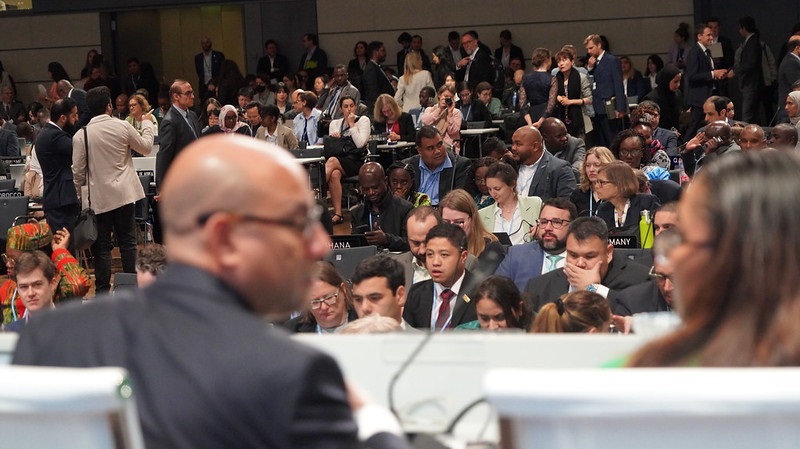UN Climate head Simon Stiell called on countries to start narrowing down options to strike a deal on post-2025 climate finance by COP29 in November
The head of the United Nations climate arm has called for governments at mid-year talks in Germany to make “serious progress” towards setting a new climate finance goal for after 2025.
Calling climate finance the “great enabler of climate action”, Simon Stiell told negotiators at the start of the annual June session in the city of Bonn that they must come up with concrete options for the New Collective Quantified Goal (NCQG) on finance.
The goal is one of the main decisions expected from the COP29 UN climate summit in November in Azerbaijan’s capital.
“We cannot afford to reach Baku with too much work to do. So please, make every hour here count,” Stiell said on Monday in his opening speech to the June 3-13 conference.
Following delays caused by an unauthorised pro-Palestinian protest and a complaint from the Russian delegation that not all its members had received visas to travel to Germany, government negotiating blocs made statements revealing sharp divisions on who should provide climate finance and how much it should be.
‼️ South African & Argentinian climate justice activists Tasneem Essop & Anabella Rosemberg were removed & de-badged after peacefully demonstrating (standing & singing) to alert to the unfolding genocide in Palestine at @UNFCCC #BonnClimateConference opening plenary. ‼️ pic.twitter.com/xUWXY8dilU
— Center for International Environmental Law (@ciel_tweets) June 3, 2024
While developing countries have repeatedly called for the current $100 billion-a-year goal to be replaced with “trillions”, developed nations have yet to propose any numbers for the target.
Several developing countries said that at least the bulk of the money should come from developed-country governments, whose responsibility it has been so far under the UN climate regime.
Developed countries, in turn, said some of it should come from the private sector and global taxes on carbon-heavy goods, as well as from the public purses of wealthier, higher-polluting developing countries.
Other divides that need to be resolved by November include a common definition of climate finance, the period the new goal should be set for, how funding flows should be monitored, and what the money should be spent on.
A longstanding target to provide $100 billion annually from 2020 was met only in 2022, according to the Organisation for Economic Coopreation and Development (OECD), two years later than the deadline developed countries agreed to back in 2009.
Mexico elects a climate scientist as president – but will politics temper her green ambition?
Diego Pacheco, a negotiator from Bolivia, told the room in Bonn that the level of ambition on the new finance goal will affect developing countries’ level of ambition in their UN climate action plans – which all nations are supposed to publish by early next year. The NCQG will determine “how words translate into actions”, he said.
Billions to trillions
To date, very few governments have made precise demands on a top-line amount for the new goal – although all have agreed it will be set from a floor of $100 billion a year.
India and the Arab group of countries, led by Saudi Arabia, have said rich countries should provide at least $1 trillion a year, while other developing country governments have repeatedly pointed to needs reaching into the “trillions”.
At a press conference in Bonn, Michai Robertson, the lead finance negotiator for small island states, warned: “The cost of inaction if we don’t spend those trillions just far exceeds the seed money we’re putting in”. War and conflict “get trillions already”, he added.
He added that many developing countries have not yet specified a precise amount as they are doing modelling and waiting for a UN “needs determination report” which is due out in October, ahead of COP29.
In their speeches, neither the European Union or Canada gave any sense of how large the target should be.
Iskander Erzini Vernoit, founder of a Moroccan think-tank called the Imal Initiative, told journalists that developed countries have not been willing to enter into discussions about how much the goal should be.
Wide or narrow sources
Vernoit said the only dimension rich nations have been willing to discuss so far is “their proposal entailing money coming from sources other than themselves”.
The EU’s delegate said in Bonn that the money should come from “a wide variety of sources, instruments and channels including innovative sources while making all financial flows consistent with the Paris Agreement”.
“While we attach great importance to the public core of the new goal, public resources alone will not suffice,” the EU negotiator said.
Rich nations meet $100bn climate finance goal – two years late
“Innovative sources” refers to a variety of money-raising proposals such as taxing billionaires, shipping emissions, planes and financial transactions. A French and Kenyan-led taskforce is currently examining these options.
Developed countries, including those in the EU, have highlighted Article 2.1c of the 2015 Paris Agreement on making finance flows, including private finance, consistent with tackling climate change. They are also pushing to widen the pool of government donors.
The EU negotiator added in Bonn that “the provision and mobilisation of climate finance should be a global effort, reflecting solid
Read More

